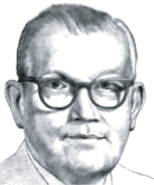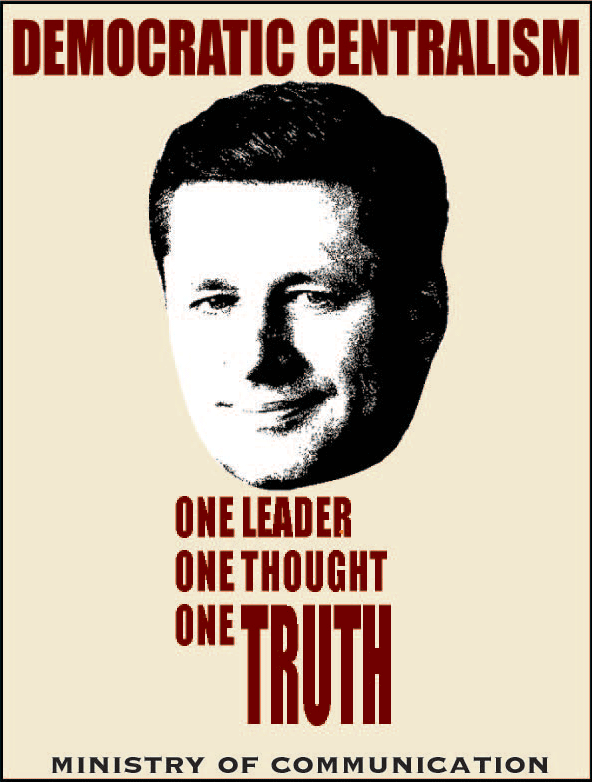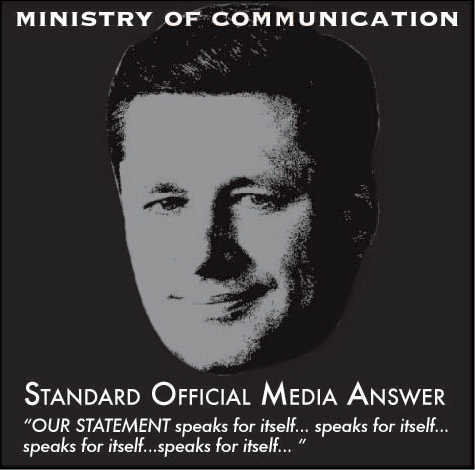
(THE SCENE: The TV studios of WTFN’s award-winning current affairs newsmagazine Face of the Nation. Host Brian Cohen, sitting in a club chair behind a coffee table, is going over his notes when he hears the floor director say: “We’re on in five…four…three…two…”(Theme music starts up over the opening titles and the director points to Cohen, who casually looks into the camera.)
 BRIAN COHEN: “Good evening, and welcome again to Face of the Nation. Tonight we take a probing look behind the façade of government to the people whose job it is to tell us what’s going on. I’m talking about the legions of ministerial spokesmen and assistants who issue statements and give interviews to explain government policy to the media and through the media to you, the public. Tonight in our studio we are pleased to have two representatives of Ottawa’s Ministerial Communications Corps: Chris Day, spokesman for Foreign Minister John Baird, and Sandra Buckler, chief of staff for Intergovernmental Affairs Minister Peter Penashue.” (Cohen rises respectfully and the two guests walk across the studio, shake hands with Cohen and sit in the two club chairs opposite him. Cohen looks perplexed because his guests are wearing Styrofoam cones on their heads.)
BRIAN COHEN: “Good evening, and welcome again to Face of the Nation. Tonight we take a probing look behind the façade of government to the people whose job it is to tell us what’s going on. I’m talking about the legions of ministerial spokesmen and assistants who issue statements and give interviews to explain government policy to the media and through the media to you, the public. Tonight in our studio we are pleased to have two representatives of Ottawa’s Ministerial Communications Corps: Chris Day, spokesman for Foreign Minister John Baird, and Sandra Buckler, chief of staff for Intergovernmental Affairs Minister Peter Penashue.” (Cohen rises respectfully and the two guests walk across the studio, shake hands with Cohen and sit in the two club chairs opposite him. Cohen looks perplexed because his guests are wearing Styrofoam cones on their heads.)
 |
CHRIS DAY: “I’ll field this one, Sandra… You see, Brian, the business of ministerial communication has changed since Stephen Harper became Canada’s government in 2006, and…”
SANDRA BUCKLER: (interrupts brusquely) “…What Chris means is ‘since Stephen Harper became the leader of Canada’s government.’ (nervous chuckling). Of course, no single person could be the whole government.” (shoots Day a subtle, cautionary look).
DAY: (heh! heh!) “Right, Sandra. Of course. Anyway, Brian, since Stephen became The Leader, ministerial communication has become more, uh… instructive.”
COHEN: “What do you mean, and what does it have to do with your bizarre headdress?”
DAY: “Stephen wants to turn Canada from a socialist backwater into a powerful world player, and to do that he needs to impose certain reforms and purge the country of long-established institutions. This is the essence of the party’s governing philosophy of Democratic Centralism. Problem is, the Parliamentary Press Gallery is rife with ‘Liberal’ journalists who believe in the values of pre-Harper Canada and are hostile to this new philosophy.”
BUCKLER: “Because the Parliament Hill reporters are hostile to our reforms, ministries operate within a ‘Cone of Silence’ with respect to the media to keep them at arm’s length.”
COHEN: “You mean, like the “Cone of Silence’ in Get Smart?”
BUCKLER: “Metaphorically speaking, yes. Stephen, er… the Party can’t enact reforms and take positions, however unpopular they may be, if the media constantly expect ministers to answer politically sensitive questions. Since communications directors are the chief spokesmen for a minister, we call ourselves the ‘Coneheads of Silence.’ We also got the idea from Saturday Night Live.”
COHEN: “Well, that explains the headdress, but this hostile posture seems to make a mockery of the whole concept of communication.”
BUCKLER: “No it doesn’t! That’s exactly the attitude we’re up against!”
DAY: “You see, Brian, we are dedicated to communication, but we don’t practise that the old ‘Liberal’ style of indulging reporters and explaining ourselves. Our job is to communicate Stephen’s vision, mainly through official ministerial statements. It’s up to the press to report what the statement says.”
COHEN: “Can you give me an example?”
 |
COHEN: “What do Israeli security and Gilad Shalit have to do with a humanitarian relief mission, and how could such a mission be considered ‘provocative’?”
DAY: “I was asked those very questions, among others, by a hostile reporter in B.C. He even had the gall to ask if the minister’s insistence on going through ‘established channels’ amounted to endorsing Israel’s illegal blockade of Gaza!”
COHEN: “I don’t see anything ‘hostile’ there at all. Those seem to be reasonable questions.”
DAY: “I’ll tell you what I told him: ‘Our statement speaks for itself.’”
COHEN: “How is that possible? Statements can’t speak…”
DAY: “…Our statement speaks for itself.”
COHEN: “Supposing a statement raises its own ques…”
DAY: “…Our statement speaks for itself.”
COHEN: “But…”
DAY: “…Our statement speaks for itself.”
COHEN: “This is insanity!”
DAY: “No, this is necessity! All communication is co-ordinated in the Prime Minister’s Office. It’s not up to me or anyone to second-guess or interpret what a minister says.”
COHEN: “Then what’s the point of a reporter even bothering to call the ministry for a comment?”
DAY: “Exactly! They shouldn’t. The reporter’s job is to report, not question.”
COHEN: (utterly incredulous) If a reporter doesn’t question, he’s no better than Judith Miller, who was a glorified stenographer for the Pentagon while masquerading as a New York Times reporter. Isn’t a free press supposed to serve the public good, not the government’s self-interest?”
BUCKLER: “Actually, Chris is perfectly correct. ‘Our statement speaks for itself’ is the government’s Standard Official Media Answer, or SOMA, to inconvenient questions about our prepared statements. You’re thinking like a Liberal, Brian.”
COHEN: “How can anyone have any faith in the honesty of what a minister says if a reporter can’t ask for clarification of a statement?”
BUCKLER: “We treat reporters professionally, but we know that even when we’re out shopping, or at an event, we’re always on. People always listen to us; they may be tape recording us; they may be videoing us. Communication must be done in a controlled manner.”
COHEN: “For example?”
BUCKLER: “For example, I had to escort the Toronto Star reporter out of the swearing-in ceremony for Intergovernmental Affairs Minister Peter Penashue.”
 |
BUCKLER: “Because the minister was overcome with emotion.”
COHEN: “So? Why should that justify the removal of a reporter? Besides, by the time you removed her, she had already witnessed Penashue’s reaction and put it in her article. What did you accomplish?”
BUCKLER: “Control. We have to make sure that the media reports stories the way we want.”
COHEN: “Even if those stories are designed to mislead?”
BUCKLER: “What are you implying?!”
COHEN: “I’m not implying anything. In January 2008 when you were Stephen Harper’s communications director…”
BUCKLER: “OK, Let’s not go there!”
COHEN: “…you stated that Canada’s military had not informed Stephen Harper of its decision to suspend the transfer of detainees to Afghan jails, but then you backtracked in the face of repeated questioning from journalists and other politicians. Why?”
BUCKLER: “Everyone makes mistakes. I simply misspoke.”
COHEN: “How could Harper not have known if then-Liberal leader Stéphane Dion had been briefed on the matter, and if then-Defence Minister Peter MacKay had been in Afghanistan when the decision was taken? In addition, Harper's foreign-policy adviser Susan Cartwright had routinely been sent monitoring reports on detainees.”
BUCKLER: “I misspoke, that’s all!”
COHEN: “You know, as I listen to both of you, it seems as if Harper has one big, centralized Ministry of Communication rather than 30-odd individual ministerial agencies.”
BUCKLER: “You could think of it like that, but such an image wouldn’t play with the public.”
COHEN: “You mean the illusion of ministerial independence has to be maintained.”
DAY: (taken aback) “Now wait a minute…”
COHEN: (patiently) “No, you wait. After listening to the way you and Sandra describe the way Harper’s ministries communicate and what they say, I feel as though I’ve been listening to two Ingsoc Party functionaries from George Orwell’s novel 1984. The suffocating, totalitarian society he depicted was run by four Ministries, each of which had a name that deliberately misrepresented its true function. The Ministry of Peace concerned itself with war, the Ministry of Truth with lies, the Ministry of Love with torture, and the Ministry of Plenty with starvation. Now we have a Canadian analog in Harper’s Ministry of Communication, which concerns itself with concealment of information. Has this parallel never occurred to either of you?”
DAY: “Never!”
COHEN: “Does the term ‘doublethink’ mean anything to you?”
BUCKLER: “Don’t be ridiculous!”
COHEN: “Well, that about does it for another show. I’d like to thank my guests Chris Day and Sandra Buckler from the Ministry of Communication. Good night, and don’t forget to watch Big Brother.”